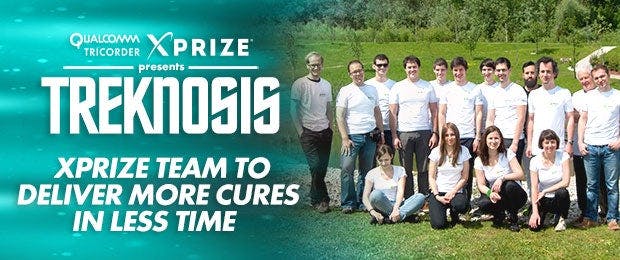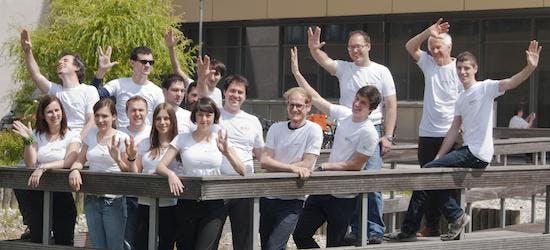Published Mar 1, 2015
XPRIZE Team To Deliver More Cures In Less Time
XPRIZE Team To Deliver More Cures In Less Time

What's the one problem with a medical tricorder? It's certainly not the battery life, the scanning capability or the sheer convenience of having an entire 24th-century medical diagnostic lab in the palm of your hand. No, the trouble is that it's still just a device: even the most state-of-the-art medical tricorder needs a good doctor to read the data, figure out what's wrong with the patient and prescribe 60ccs of inaprovaline, stat. To Jakob Šušteri? and the rest of Team MESI, that's what a medical tricorder is for: to amplify the powers of primary care physicians by giving them all the information they need, exactly when they need it.
Šušteri? established MESI in 2010 with an idea for a device that would help doctors screen for peripheral artery disease. In 2012, they released it for sale to striking success. That, recalls Šušteri?, is "when we started exploring to see how we could help primary care physicians in a bigger way than we had before. Primary care physicians in particular often have the big problem of not having enough data to make the right decision when they need it, which leads to so many other difficulties: wrong diagnoses, the wrong treatments being prescribed, referrals to the wrong secondary care—all down to insufficient data. We asked ourselves: why don't they have the data they need?" MESI identified three types of information in particular:• Data from a particular diagnostic device, like a thermometer or blood pressure cuff.• The patient's overall medical history, typically found in medical records.• General vital sign data captured over a period of time from the patient's everyday life.
Taken together, all this data would theoretically paint a complete patient picture, enabling their primary care doctor to make better diagnoses and recommendations from the start, increasing their effectiveness.

Of course, the picture doesn't get painted unless something like a medical tricorder appears in the doctor's hand. "When we saw the [Qualcomm Tricorder XPRIZE] competition was starting up, we knew we had to be in it: the tricorder is one-third of our approach," Šušteri? explains. MESI teamed up with other Slovenian companies and institutes, each bringing their own areas of expertise from industrial design to electrical engineering.
"Officially, as CEO of MESI, I'm the team leader," Šušteri? says, "but our operational team leader is my colleague Ana Mlinar, who manages the organization. She's an excellent team leader — she's the one who has to deal with so many different people and convince them that a particular solution is the right way to go, but she's also a good listener who hears what people have to say and brings it back to the company." It also doesn't hurt that Mlinar is the Star Trek fan in the group: "She absolutely knew what goal we were heading to, technologically," he says.
Aside from Mlinar's leadership, what else sets Team MESI apart in the race to build a medical tricorder? "We're strong in user experience," Šušteri? points out. "We have a track record in hearing what doctors have to say about their work and developing products that'll help them actually make their work more efficient, accurate, and simple. We know what to look for when we're visiting doctors: we listen to them and see what their needs are, and are able to deliver the right concept for the problem."
Even though the tricorder may end up in the consumer's hands, MESI sees the primary care physician as its true customer, Šušteri? says. "A consumer is fully responsible for his health, but he has to be guided, managed by a doctor. If he wants to make his health better, the consumer still has to deliver the data from the tricorder to the doctor, because only the doctor can act on that data: he's the one holding the magic wand, so to speak, the one who can prescribe drugs or secondary care, that sort of thing. We're delivering solutions to the primary care physician."

"As a final result," Šušteri? muses, "I see the primary care physician being much more valuable for the health care sector. Everybody glamorizes surgeons and cardiologists, but primary care doctors are undervalued and underappreciated, even though they're theoretically the most crucial part of health care. We want to make them important again; by bringing them better data, we can help them make better decisions faster, which of course will make patients healthier.
Jon Sung is a contributing writer for XPRIZE and copywriting gun-for-hire to startups and ventures all over the San Francisco Bay area. When not wrangling words for business or pleasure, he serves as the captain of the USS Loma Prieta, the hardest-partying Star Trek fan club in San Francisco.
XPRIZE is an innovation engine. We design and operate prize competitions to address global crises and market failures, and incentivize teams around the world to solve them. Currently, we are operating numerous prizes including the $30M Google Lunar XPRIZE, challenging privately funded teams to successfully land a robot on the Moon’s surface, and the $10M Qualcomm Tricorder XPRIZE, challenging teams around the world to create a portable, wireless, Star Trek-inspired medical device that allows you to monitor your health and medical conditions anywhere, anytime. The result? Radical innovation that will help us all live long and prosper.
Sign up today to join our mission, be a part of our campaign and win collectibles at: tricorderfederation.org.




